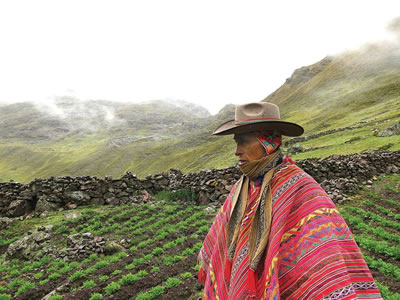The sale of natural foods, cosmetics and other products made from Peru’s rich biodiversity will hit a record $470 million this year. But long-term growth depends on striking a delicate balance between foreign investors’ wants and local communities’ needs.
A growing appetite among global consumers for environmentally-friendly products helped drive BioTrade sales from just $40 million in 2003 to more than $5 billion in 2016. Such growth offers huge opportunities for Peru, home to around 10% of the world’s plant species.
“Megadiverse countries such as Peru have a great potential to develop activities based on natural products and ingredients, which can attract investors,” José Álvarez, the director general of biodiversity for Peru’s environment ministry, said at an UNCTAD BioTrade workshop in Lima on 12 and 13 September.
But to capitalize on that potential, he said, the government must be able to provide firms the necessary permits and certificates in a timely manner. And this is proving to be a challenge for the South American country.
At the heart of the issue is the Nagoya Protocol on access and benefit sharing, an international convention that entered into force in 2014 and has been ratified by 107 countries, including Peru.

- Taller Nacional: Promoviendo una implementación efectiva del Protocolo de Nagoya y el BioComercio (12-13 September 2018)
- BioTrade and Access and Benefit Sharing: From concept to practice - A handbook for policymakers and regulators
In short, the Nagoya Protocol ensures states and local communities get a fair share of the benefits obtained from the access to and commercialization of genetic resources found in the country’s plants, animals and microorganisms.
This means that before a business can begin research and development in Peru on, for example, a new natural ingredient for medicinal purposes, it must first agree to an access and benefit sharing (ABS) contract with the government. The firm must also obtain a separate license with local communities if it intends to use the traditional knowledge associated with the genetic resource.
“In the past, foreign companies in sectors like pharmaceutics, food and cosmetics were taking home all the profits made from developing countries’ biodiversity without compensating the government or communities,” UNCTAD legal officer David Vivas said.
“But the situation has changed with the Nagoya Protocol, as ethical companies are now requesting legal access for genetic resources in countries like Peru.” Mr. Vivas said.
But countries like Peru are struggling to update their administrative procedures and regulations, and to respond in a timely manner to firms’ request for access.
So far, Peru hasn’t issued any ABS contracts for commercial purposes – though it has issued several for non-commercial research.
“The government agencies responsible for granting access to genetic resources in Peru face numerous challenges, such as understaffed offices and a lack of experience in dealing with access contracts with commercial purposes,” Mr. Vivas said. “They need clear support to make the system work.”
The risk is that if firms find it too cumbersome to play by the rules they will simply disregard the protocol and national regulations.
“It must be easier for companies to comply with the law than to ignore it,” Mr. Vivas said, adding that possible solutions could be a single windows system and a fast track option for BioTrade companies.
During the two-day workshop in Lima, UNCTAD presented a BioTrade and ABS handbook and model clauses for access contracts for commercial purposes that it developed with Peru’s environment ministry.
“This is the first-time model clauses for commercial purposes were put forward in the country, and they received very positive feedback from the participants,” Mr. Vivas said. Attendees included officials from the ministries of environment, agriculture, trade, production, and tourism.
The workshop was organized with the support of the Development Bank of Latin America (CAF), the Swiss Secretariat of Economic Affairs and Cooperation (SECO) and the German Agency for International Cooperation (GIZ).


